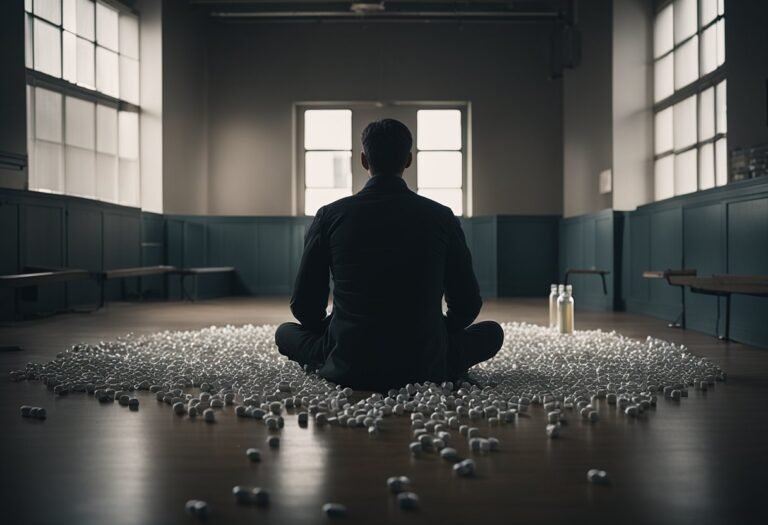Depression, a complex mental health condition impacting millions worldwide, goes beyond simply feeling down for a brief period. It’s a persistent state characterized by a combination of depression symptoms and signs of depression, including sadness, hopelessness, and a loss of interest in once-enjoyable activities. While the exact causes remain under investigation, it’s believed to be a combination of biological, psychological, and social factors.
This blog post explores the various signs and symptoms of depression. It goes beyond a simple list, explaining how depression manifests differently depending on factors like age, gender, and life experiences. It covers emotional signs like sadness and hopelessness, behavioral changes like social withdrawal and fatigue, and physical symptoms like aches and pains. The blog emphasizes the importance of seeking help for depression and offers resources for doing so.
Recognizing the various signs and symptoms of depression is crucial for seeking help and starting the journey towards recovery. This article delves into the different manifestations of depression, helping you identify them within yourself or someone you care about.
Contents
- 1 Emotional Symptoms of Depression
- 2 Behavioral Signs of Depression
- 3 Physical Signs of Depression
- 4 Beyond the List: Individual Experiences of Depression Symptoms and Signs
- 5 Seeking Help and Moving Forward with Depression Symptoms and Signs
- 6 Different Faces of Depression: Bipolar Disorder and Other Conditions
- 7 Treatment Options for Depression and Anxiety
- 8 Additional Resources:
- 9 Frequently Asked Questions
- 9.1 What are the common symptoms of depression?
- 9.2 How can I tell the difference between feeling down and having depression?
- 9.3 Is depression more common in men or women?
- 9.4 Can depression affect teenagers differently?
- 9.5 Are there different types of depression?
- 9.6 What are some treatment options for depression?
- 9.7 How long does it take to feel better from depression?
- 9.8 What can I do if I think someone I know might be depressed?
- 9.9 Where can I find more information and support for depression?
- 9.10 If I’m feeling suicidal, what should I do?
Emotional Symptoms of Depression
- Persistent Sadness: A pervasive feeling of sadness or emptiness that lingers for most of the day, nearly every day. This sadness may be tearful or a numb feeling of despair.
- Loss of Interest (Anhedonia): Activities that once brought joy and excitement no longer hold appeal. This core symptom, often referred to as anhedonia, can encompass hobbies, social interactions, or even favorite pastimes.
- Hopelessness and Helplessness: A pervasive feeling that there’s no point in anything and nothing will ever get better. This can lead to a sense of powerlessness and a lack of motivation to make changes.
- Irritability and Anger: Increased frustration, outbursts of anger, or a short temper can be signs of underlying depression.
- Anxiety and Worry: Depression often co-occurs with anxiety, leading to excessive worry and nervousness. This creates a cycle of anxiety depression symptoms.
- Loss of Self-Esteem: Feeling worthless, guilty, or like a burden to others is a common symptom. Negative self-talk and harsh self-criticism become prevalent.
Behavioral Signs of Depression

- Changes in Sleep Patterns: Difficulty falling asleep, waking up frequently during the night, or sleeping excessively are all potential indicators of depression.
- Changes in Appetite: Significant weight loss due to loss of appetite or weight gain due to emotional overeating may occur.
- Social Withdrawal: Isolating oneself from loved ones, neglecting social obligations, and avoiding activities one used to enjoy are signs of withdrawal.
- Fatigue and Lack of Energy: Even simple tasks require a significant effort, and a general feeling of lethargy persists.
- Decreased Concentration and Decision-Making: Difficulty focusing, remembering details, and making decisions can hinder daily functioning.
- Restlessness or Slowed Down Movement: Physical restlessness or a noticeable slowing down of physical movements can be present.
- Increased Use of Alcohol or Drugs: Self-medication with substances to numb emotional pain is a dangerous coping mechanism.
- Thoughts of Death or Suicide: In severe cases, individuals may have thoughts of death or suicide. It’s crucial to take these thoughts seriously and seek immediate help.
Physical Signs of Depression
- Unexplained Aches and Pains: Headaches, body aches, and digestive problems that have no clear physical cause can be associated with depression.
- Changes in Sex Drive: A significant decrease in libido or interest in sexual activity can be a symptom.
It’s important to note that not everyone experiences all of these depression symptoms and signs, and the severity can vary greatly. Some people may have a few mild symptoms, while others experience a cluster of intense symptoms. Additionally, some symptoms may overlap with other mental health conditions, so a proper diagnosis from a mental health professional is essential.
Beyond the List: Individual Experiences of Depression Symptoms and Signs
Depression manifests differently in everyone. Here are some factors to consider:
- Age: Symptoms of depression in teens may present differently than in adults or older adults. Children may exhibit more physical symptoms like fatigue or changes in appetite, while teenagers may struggle with irritability or social withdrawal. Adults typically experience the core emotional symptoms, and older adults may experience symptoms related to isolation or loss.
- Gender: Women are more likely to experience depression than men. This is partly due to hormonal fluctuations and societal pressures. There can be distinct signs of depression in women compared to men.
- Medical Conditions: Chronic illnesses or physical limitations can contribute to depression. Pain and the stress of managing a medical condition can take a toll on mental well-being.
- Life Events: Stressful life events like a job loss, a break-up, or the death of a loved one can trigger depression. These events can lead to feelings of loss, hopelessness, and overwhelm, which can contribute to depressive symptoms and signs.
Seeking Help and Moving Forward with Depression Symptoms and Signs
If you suspect you or someone you know might be struggling with depression, don’t hesitate to seek help. Early intervention is crucial for managing depression.
Different Faces of Depression: Bipolar Disorder and Other Conditions
While the focus of this discussion has been on major depressive disorder (MDD), it’s important to acknowledge that depression can manifest in other forms. Here’s a brief overview of two such conditions:
- Bipolar Depression Disorder Symptoms: Bipolar disorder, also known as manic-depressive illness, is a complex condition characterized by cycles of mood swings. These swings can range from extreme highs (mania) to extreme lows (depression). During a depressive episode, someone with bipolar disorder may experience many of the same symptoms as MDD, including sadness, hopelessness, and loss of interest. However, they may also experience symptoms specific to bipolar depression, such as psychomotor agitation (feeling restless or wired) or difficulty sleeping despite feeling very tired.
- Peripartum Depression Symptoms (including Postpartum Depression): Peripartum depression is a mood disorder that affects women during pregnancy and after childbirth. Postpartum depression is the most common form, typically occurring within the first year after childbirth. Symptoms can include many of those seen in MDD, along with feelings of anxiety, irritability, and difficulty bonding with the baby. If you’re experiencing symptoms of peripartum depression, it’s crucial to seek help from a healthcare professional or mental health specialist.
Treatment Options for Depression and Anxiety
Fortunately, there are effective treatments available for depression and many people with depression experience significant improvement with treatment. Here’s a glimpse into some common approaches:
- Therapy: Psychotherapy, also known as talk therapy, can be a highly effective treatment for depression. There are different types of therapy available, such as cognitive behavioral therapy (CBT) and interpersonal therapy (IPT). These therapies can help individuals develop coping mechanisms, identify negative thought patterns, and improve communication skills.
- Medication: Antidepressant medications can help regulate brain chemicals that are often imbalanced in depression. A doctor or psychiatrist can work with you to find the right medication and dosage for your individual needs. It’s important to note that medication typically takes some time to work effectively.
- Lifestyle Changes: Making healthy lifestyle changes can significantly improve symptoms of depression. This includes getting regular exercise, eating a balanced diet, getting enough sleep, and practicing relaxation techniques such as yoga or meditation.
Remember, you are not alone. Depression is a common condition, and there is help available. If you are experiencing symptoms of depression, reach out to a trusted friend, family member, doctor, or mental health professional. There is hope for recovery and a brighter future.
Additional Resources:
- National Institute of Mental Health: [National Institute of Mental Health depression ON National Institutes of Health (.gov) nimh.nih.gov]
- National Alliance on Mental Illness (NAMI): [nami national alliance on mental illness ON nami.org]
- The Jed Foundation: [jed suicide prevention ON The Jed Foundation jedfoundation.org]
- Crisis Text Line: Text HOME to 741741
By understanding the signs and symptoms of depression, seeking help, and taking steps towards treatment, you can manage your depression and live a fulfilling life.
Frequently Asked Questions
What are the common symptoms of depression?
Depression can manifest in various ways, but some common symptoms include persistent sadness, loss of interest in activities you once enjoyed, changes in sleep or appetite, fatigue, difficulty concentrating, feelings of worthlessness or hopelessness, and thoughts of death or suicide.
How can I tell the difference between feeling down and having depression?
Feeling sad or unmotivated for a short period is normal. However, depression is a persistent state that interferes with daily life for at least two weeks. If you’re experiencing symptoms for an extended period, it’s important to seek professional help for a diagnosis.
Is depression more common in men or women?
Women are more likely to experience depression than men. This is partly due to hormonal fluctuations and societal pressures. However, depression affects people of all genders.
Can depression affect teenagers differently?
Yes, depression can manifest differently in teenagers. They may exhibit more physical symptoms like fatigue or changes in appetite, or struggle with irritability and social withdrawal, rather than the core emotional symptoms more common in adults.
Are there different types of depression?
Yes, major depressive disorder (MDD) is the most common type. However, other forms exist, such as bipolar disorder which involves mood swings between mania and depression, and peripartum depression which affects women during pregnancy and after childbirth (including postpartum depression).
What are some treatment options for depression?
Effective treatments for depression include psychotherapy (talk therapy), medication like antidepressants, and lifestyle changes like getting regular exercise, eating a balanced diet, and practicing relaxation techniques.
How long does it take to feel better from depression?
Recovery from depression takes time and varies depending on the individual. Therapy and medication typically take several weeks to show improvement, and a combination of approaches often leads to the best results.
What can I do if I think someone I know might be depressed?
Offer support, listen without judgment, encourage them to seek professional help, and help them find resources like mental health professionals or support groups.
Where can I find more information and support for depression?
Numerous resources are available online and in your community. Here are a few good starting points: * National Institute of Mental Health: [National Institute of Mental Health depression ON National Institutes of Health (.gov) nimh.nih.gov] * National Alliance on Mental Illness (NAMI): [nami national alliance on mental illness ON nami.org]
If I’m feeling suicidal, what should I do?
If you’re experiencing thoughts of suicide, please reach out for help immediately. You are not alone. Here are some resources: * Crisis Text Line: Text HOME to 741741 * National Suicide Prevention Lifeline: 988
Remember, depression is treatable, and there is hope for recovery.







